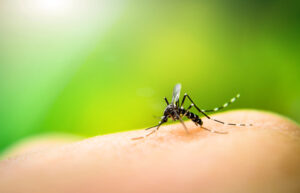July 31, 2024 | Black & Kletz Allergy

The typical localized itching, swelling, and/or redness of the skin that results from the bite is not directly due to the bite itself, but rather caused by the body’s immune response to the proteins in the mosquito’s saliva. In extremely rare occurrences, an individual with a true mosquito allergy, which by itself is rare, may develop a classic systemic allergic reaction (i.e., anaphylaxis) whereby the bite can trigger a life-threatening allergic reaction. An “allergic reaction” to a mosquito bite is when there is a severe immune reaction against the salivary proteins of the mosquito. As emphasized above, this is very uncommon but these mosquito-allergic individuals may experience generalized itchiness (i.e., pruritus), hives (urticaria), wheezing, shortness of breath, nausea, vomiting, diarrhea, abdominal pain, throat closing sensation, lightheadedness, dizziness, fainting, increased heart rate, and/or drop in blood pressure. A self-injectable epinephrine device (e.g., EpiPen, Auvi-Q, Adrenaclick) should be prescribed for any person with a true mosquito allergy who have exhibited systemic symptoms in the past. It is important to note that if one uses a self-injectable epinephrine device, they should go immediately to the closest emergency room. Individuals with anaphylaxis or systemic reactions from a mosquito bite should also be referred to a board certified allergist like the ones at Black & Kletz Allergy.
The development of a true allergic reaction from mosquitoes usually progresses as follows:
- Individuals who have never been exposed to a particular species of mosquito do not usually develop reactions to the initial bites from such mosquitoes.
- Subsequent bites result in delayed local skin reactions.
- After recurrent mosquito bites, immediate wheals (i.e., hives) may develop.
- With additional exposure, the delayed local reactions diminish and eventually disappear, although the immediate reactions persist.
- Individuals who are repeatedly exposed to mosquito bites from the same species of mosquito eventually also lose their immediate reactions. They become tolerant to the mosquito bite. This is in essence what happens when an allergy patient receives allergy shots to environmental allergens. The allergy injections cause the individual who may be allergic to dust mites, molds, pollens, or pets become less bothered by these allergens since they develop antibodies to the allergens.
In addition to local and systemic reactions to mosquitoes, one must be concerned about the mosquito-borne diseases that may result from a simple mosquito bite. Some of the diseases that are known to be transmitted by mosquitoes include malaria, West Nile virus, dengue fever, encephalitis, chikungunya, yellow fever, Eastern equine encephalitis filariasis (i.e., elephantiasis), St. Louis encephalitis, Japanese encephalitis, Western equine encephalitis, Zika virus-related illnesses, Venezuelan equine encephalitis, Ross River fever, Rift Valley fever, and La Crosse encephalitis.
Avoiding exposure to mosquitoes is the best solution to prevent mosquito bites. Even if you stay indoors, it is recommended that one install screens in the windows and doors in order to help prevent mosquito exposure. Unfortunately, it is not always easy to avoid them if you plan to leave the house. If you venture outdoors, stay clear of free-standing water as mosquitoes tend to congregate and breed there. Avoid going outside from dusk until dawn, if possible, as mosquito bites occur more often during this time. Wear permethrin-treated clothing as well as light-colored long-sleeved clothing and hats. Use a bed net if sleeping outdoors. Use citronella-scented candles when at outdoor events. Use insect repellent that preferably contains a 10-25% concentration of DEET (N,N-diethyl-3-methyl-benzamide or N,N- diethyl-meta-toluamide). Alternatively, one can use insect repellents containing either picaridin or oil of lemon eucalyptus.
The treatment of run-of-the mill local reactions from mosquito bites vary depending on the severity of the reaction. Applying a cold pack or ice to the affected area is sometimes helpful. Using various creams (e.g., calamine lotion, anti-itch creams, topical antihistamines, corticosteroid creams) topically often give some relief. Oral antihistamines may offer additional relief in certain individuals. As mentioned above, anyone who has had a systemic reaction to mosquito bites should be prescribed a self-injectable epinephrine device and referred to a board certified allergist.
The board certified allergy specialists at Black & Kletz Allergy see patients of all ages and have over 50 years of experience in the field of allergy, asthma, and immunology. Mosquito bites as well as other insect bites (e.g., bees, wasps, yellow jackets, hornets, spiders) are common occurrences that we routinely diagnose and treat. Black & Kletz Allergy has 3 offices in the Washington, DC, Northern Virginia, and Maryland metropolitan area. Our offices are located in Washington, DC, McLean, VA (Tysons Corner, VA), and Manassas, VA and all locations have on-site parking. Our Washington, DC and McLean, VA offices are Metro accessible and we offer a free shuttle that runs between our McLean, VA office and the Spring Hill metro station on the silver line. To make an appointment, please call us or alternatively, you can click Request an Appointment and we will respond to your request within 24 hours by the next business day. The allergists at Black & Kletz Allergy are happy to answer any questions or concerns you may have about any allergic, asthmatic, or immunologic issue.












